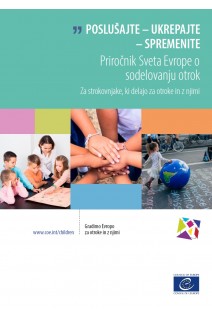PRÉFACE REMERCIEMENTS COMMENT UTILISER CE MANUEL ? PARTIE 1 : COMPRENDRE LA PARTICIPATION DES ENFANTS EN THÉORIE ET EN PRATIQUE
1.1 LE DROIT DES ENFANTS D’ÊTRE ENTENDUS SUR LES QUESTIONS QUI LES CONCERNENT
1.2 POURQUOI LA PARTICIPATION DES ENFANTS EST-ELLE SI IMPORTANTE ?
1.3 LES IMPLICATIONS DU PROCESSUS DE PARTICIPATION DES ENFANTS
1.4 L’INFLUENCE DES ENFANTS DANS LES PROCESSUS PARTICIPATIFS
1.5 FAIRE LES CHOSES CORRECTEMENT : UNE PARTICIPATION SÛRE, ÉTHIQUE, INCLUSIVE ET EFFICACE
1.6 DES ENVIRONNEMENTS FAVORABLES
PARTIE 2 : CRÉER DES ORGANISATIONS ET ENVIRONNEMENTS PARTICIPATIFS
2.1 GARANTIR L’APPROPRIATION DU PROCESSUS AU PLUS HAUT NIVEAU
2.2 ÉVALUER LA SITUATION ACTUELLE
2.3 CONCEVOIR UNE POLITIQUE ET DES PROCÉDURES ORGANISATIONNELLES
2.4 RENFORCER LES CAPACITÉS DES PERSONNELS
2.5 INSTAURER DES MÉCANISMES DE PLAINTE SÛRS ET ADAPTÉS AUX ENFANTS
2.6 SUIVRE ET ÉVALUER LA MISE EN OEUVRE
PARTIE 3 : LES ENFANTS EN TANT QU’INDIVIDUS
3.1 PRÉPARER ET PLANIFIER
3.2 ÉTABLIR UN LIEN AVEC LES ENFANTS
3.3 IDENTIFIER LES PROBLÈMES ET LES PRIORITÉS
3.4 RECUEILLIR LE POINT DE VUE DES ENFANTS
3.5 AGIR
3.6 ASSURER UN SUIVI
3.7 DRESSER LE BILAN, ENGAGER UNE RÉFLEXION ET RECOMMENCER
PARTIE 4 : PARTICIPATION COLLECTIVE
4.1 PRÉPARER ET PLANIFIER
4.2 ÉTABLIR UN LIEN AVEC LES ENFANTS
4.3 IDENTIFIER LES PROBLÈMES ET LES PRIORITÉS
4.4 RECUEILLIR LE POINT DE VUE DES ENFANTS
4.5 AGIR
4.6 ASSURER UN SUIVI
4.7 DRESSER LE BILAN, ENGAGER UNE RÉFLEXION ET RECOMMENCER
PARTIE 5 : RESSOURCES
5.1 NORMES JURIDIQUES
5.2 LA PARTICIPATION DES ENFANTS DANS DIFFÉRENTS CONTEXTES OU AVEC DIFFÉRENTS GROUPES : ORIENTATIONS ET EXEMPLES
5.3 ACTIVITÉS (PARTICIPATION COLLECTIVE)
5.4 SENSIBILISATION ET MILITANTISME DES ENFANTS
5.5 RENFORCEMENT DES COMPÉTENCES
5.6 INSTITUTIONS PARTICIPATIVES
5.7 SUIVI ET ÉVALUATION
5.8 BASES THÉORIQUES
5.9 DIVERS
ANNEXE 1 : LES NEUF PRESCRIPTIONS DE BASE POUR UNE PARTICIPATION EFFICACE ET ÉTHIQUE : IMPLICATIONS CONCRÈTES
ANNEXE 2 : ORIENTATIONS SUR L’ÉLABORATION D’INFORMATIONS ACCESSIBLES
ANNEXE 3 : AIDE-MÉMOIRE POUR GARANTIR LA SÉCURITÉ ET LE BIEN-ÊTRE
ANNEXE 4 : LUTTER CONTRE LA DISCRIMINATION : IMPLICATIONS CONCRÈTES
ANNEXE 5 : AIDE-MÉMOIRE POUR EXPLIQUER LE RÔLE DES ENFANTS DANS LES RENCONTRES ET LES PROCÉDURES
ANNEXE 6 : AIDE-MÉMOIRE POUR COMMUNIQUER AVEC LES ENFANTS
ANNEXE 7 : QUESTIONS ESSENTIELLES POUR PRÉPARER LA PARTICIPATION COLLECTIVE
ANNEXE 8 : AIDE-MÉMOIRE POUR GARANTIR LA LIBERTÉ D’EXPRESSION ET D’ASSOCIATION




